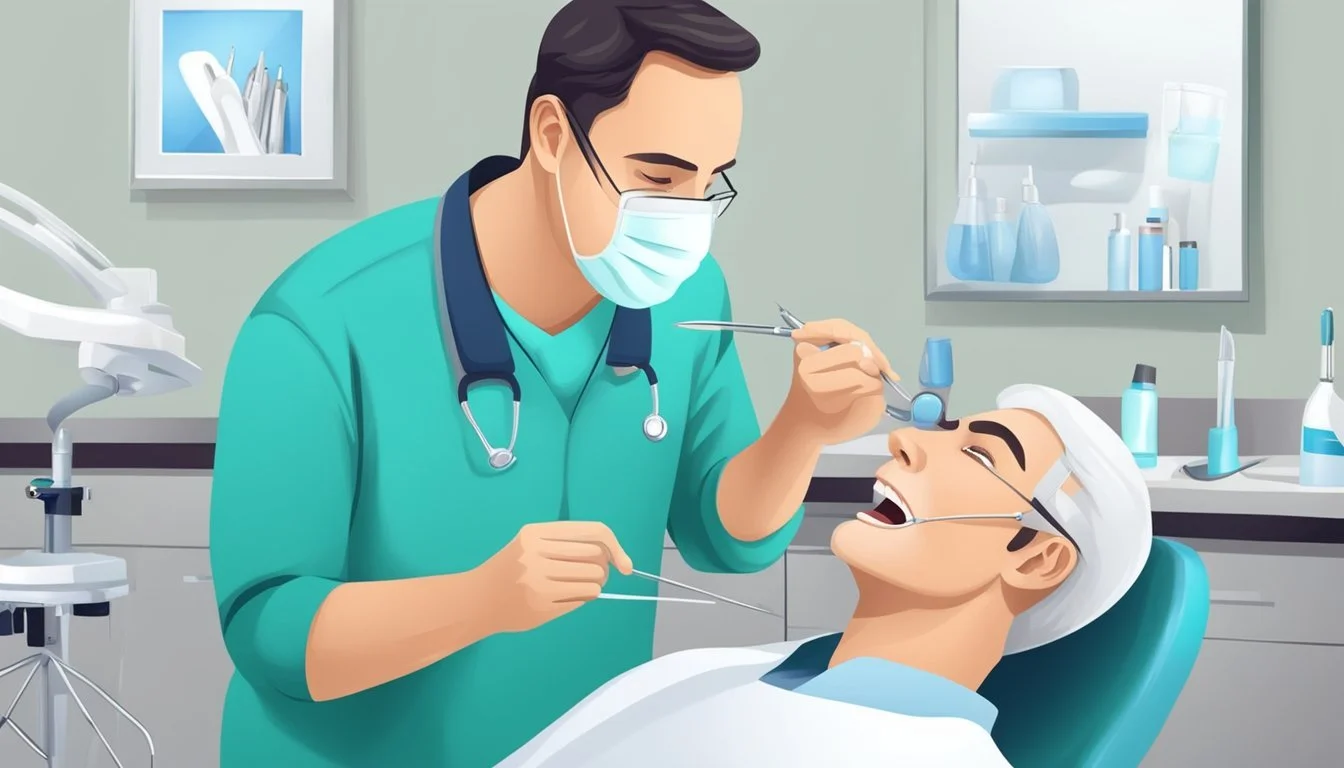Carnivore Diet and Dental Health
Understanding the Impact on Oral Hygiene
This Article is Part Of Our Guide on the Carnivore Diet
The carnivore diet, an all-meat regimen, has recently gained attention for its claimed health benefits, including its effects on dental health. This diet strictly consists of animal products such as meat, fish, eggs, and certain dairy products, eliminating all plant-based foods from one's nutrition. Proponents suggest that by reducing intake of sugars and carbs, typically linked to dental decay, individuals may experience improved oral health.
Emerging discussions among dental professionals and diet enthusiasts explore the potential impacts of a carnivore diet on the maintenance of teeth and gums. Some initial observations have indicated a decrease in plaque formation and a healthier balance of oral bacteria, both of which are essential for preventing cavities and gum disease. However, it is important to approach these claims with a careful consideration of scientific evidence and the understanding of a balanced diet's role in overall health, including dental well-being.
Overview of the Carnivore Diet
The carnivore diet has gained attention for its strict inclusion of animal-based foods and its exclusion of plant-based foods, sparking debates on its health impacts.
Defining the Carnivore Diet
The carnivore diet is a regimen that solely consists of animal products: meat, fish, and dairy. It's a highly restrictive diet where individuals consume meat from various sources including beef, pork, chicken, and fish, along with other animal-derived products such as eggs and certain dairy items like cheese and butter. This diet eliminates all plant-based foods, thereby also cutting out carbohydrates, fibers, and many vitamins and minerals that are predominantly found in fruits, vegetables, legumes, nuts (how long do nuts last?), and grains.
Comparison to Other Diets
Comparatively, the ketogenic diet also emphasizes a high intake of fats but allows for low-carb vegetables and is not as restrictive in terms of food variety. Paleo diet adherents eat a balance of meat, fish, and plant-based foods but avoid processed foods and dairy, in an attempt to mirror the dietary patterns of Paleolithic humans. Both ketogenic and paleo diets include plant-based components, which the carnivore diet strictly excludes. The carnivore diet can be considered one of the most extreme low-carb diets, as it reduces the carbohydrate intake to nearly zero, focusing almost entirely on protein and fat from animal sources.
Impact on Oral Health
This section explores the relationship between a carnivore diet and dental health, focusing on the consumption of meat, the essential nutrients for healthy teeth, and potential oral health risks.
Meat Consumption and Dental Health
A carnivore diet increases meat intake which impacts oral health in various ways. Meat is typically low in fermentable carbohydrates, which can lead to a reduced risk of dental caries. However, meat fibers can become lodged between teeth, necessitating good oral hygiene to prevent periodontal issues. Moreover, meat's protein and phosphorus contents may support tooth enamel repair and maintenance.
Nutrients Importance for Dental Health
Essential nutrients play a crucial role in maintaining dental health. A carnivore diet is rich in protein, calcium, phosphorus, and often vitamin D - all important for strong teeth and bones. Calcium and phosphorus are fundamental for the remineralization of teeth, while vitamin D helps in their absorption. Saliva production is essential for oral health, as it contains proteins and minerals that protect tooth enamel and phosphorus to support the teeth's defense against caries.
Potential Risks for Oral Health
While there are benefits, a carnivore diet also presents potential risks for oral health. Excluding plant-based foods may lead to deficiencies in certain vitamins like vitamin C, which is important for gum health. A lack of dietary fiber from fruits and vegetables could result in decreased saliva production, which is necessary for neutralizing oral bacteria and maintaining pH levels in the mouth. Proper supplementation and oral hygiene practices are critical to mitigate these risks.
Nutritional Considerations
The Carnivore Diet, exclusively focused on animal products, requires careful attention to micronutrient intake and managing potential nutrient deficiencies.
Role of Micronutrients
Micronutrients, such as vitamins and minerals, are essential for maintaining oral health. Vitamin C, for instance, is not readily available in animal products, yet it is crucial for gum health and the maintenance of connective tissue in the mouth. On the other hand, Vitamin B12, abundantly found in meat, supports healthy red blood cell formation, which is vital for transporting oxygen to oral tissues.
Iron is another important micronutrient, with red meat being a rich source. It helps prevent anemia, which can manifest in the form of paleness of the gums. However, it's important to note that while the diet provides ample iron, it lacks Vitamin E, an antioxidant critical for combatting oxidative stress in oral tissues.
Managing Nutrient Deficiencies
Individuals on the Carnivore Diet must be vigilant to avoid nutrient deficiencies. Without a diverse source of foods, one could risk inadequate intake of certain nutrients:
Vitamin C: Necessary for collagen synthesis and immune function; deficiency may lead to weakened gums and teeth.
Vitamin E: Has anti-inflammatory properties; scarcity could impair oral health.
To prevent deficiencies, they may consider:
Selecting organ meats, which can provide a broader range of nutrients than muscle meats alone.
Discussing with healthcare providers about the need for supplementation, especially for nutrients not commonly found in animal products.
By taking these steps, one can help ensure a balance in micronutrient levels while adhering to the Carnivore Diet.
Dental Diseases and the Carnivore Diet
The carnivore diet's impact on oral health primarily revolves around tooth decay and gum disease, focusing on prevention and the role of diet in inflammation.
Preventing Tooth Decay and Cavities
Tooth decay and cavities are significant concerns for many individuals. The carnivore diet, which excludes plant-based foods, may alter the oral microbiome due to the absence of fermentable carbohydrates that bacteria use to produce acid, a contributing factor to enamel erosion. The diet's high intake of animal products provides essential minerals like calcium and phosphorus, which are vital for strengthening tooth enamel. Evidence suggests that excluding sugary and starchy foods could reduce the likelihood of developing cavities.
Key Components in Animal Products:
Calcium: Strengthens enamel and the underlying dentin structure
Phosphorus: Aids in the remineralization of teeth
Gum Disease and Inflammation
Gum disease is often a result of inflammation caused by the accumulation of bacteria along the gum line. The carnivore diet, which typically lacks sugars and complex carbohydrates, may contribute to reducing the available food for harmful oral bacteria, potentially decreasing the risk of gum disease. However, it is essential for individuals following this diet to ensure proper oral hygiene practices to remove protein particles that can also lead to bacterial growth and inflammation.
Factors in Oral Health Maintenance:
Regular brushing and flossing to remove protein debris
Adequate hydration to promote saliva production, which naturally cleanses the oral cavity
Oral Hygiene Practices on the Carnivore Diet
Adhering to a carnivore diet necessitates a tailored approach to oral hygiene due to the absence of certain foods that typically contribute to dental health. Maintaining oral hygiene on this diet involves a consistent routine and professional oversight.
Recommended Oral Hygiene Routine
Individuals on a carnivore diet should brush their teeth twice daily with fluoride toothpaste to prevent plaque buildup and cavities. Due to the high protein content of their diet which can lead to increased buildup on teeth, they might benefit from an antibacterial mouthwash to reduce harmful oral bacteria. Flossing daily is crucial to remove food particles between teeth, which can be more common with the fibrous nature of meats.
Brushing: At least 2 minutes per session using a soft-bristled toothbrush.
Flossing: Gently maneuvering floss between each tooth and along the gum line.
Mouthwash: Utilize an antibacterial mouthwash to target bacteria that brushing and flossing might miss.
Professional Dental Care
Regular dental check-ups are essential for anyone on a carnivore diet to monitor for potential diet-related dental issues. A dental professional can provide professional cleanings to remove tartar that at-home brushing and flossing can't. They can also give personalized advice on specific oral care needs related to a meat-rich diet.
Dental Check-Ups: Visit a dentist every 6 months, or as recommended.
Professional Cleanings: These should be part of the biannual dental visit to ensure complete oral health.
Benefits and Potential of Healing
This section delves into the positive impact that a carnivore diet can have on dental health, with a focus on optimizing oral health and enhancing the body's natural healing processes.
Optimizing Oral Health
A primary benefit of the carnivore diet on dental health is related to the exclusion of refined sugars and carbohydrates, key contributors to tooth decay. Research has suggested that high-protein, low-carbohydrate diets can improve the balance of oral bacteria. This balance is crucial for preventing cavities and gum disease. In such a diet, an increase in saliva production typically occurs, which is beneficial because saliva contains enzymes that protect teeth by neutralizing harmful acids and initiating the digestion of food.
Saliva Production: Enhances natural defenses against cavities
Reduced Sugar Intake: Lowers the risk of developing tooth decay
Recovery and Regeneration
The carnivore diet may also support healing within the oral cavity. Without the presence of sugar-laden foods that often contribute to inflammation and dental erosion, the body can potentially recover from existing dental issues more efficiently. Additionally, the emphasis on high-quality proteins provides essential amino acids necessary for tissue repair and regeneration.
Reduced Inflammation: A meat-based diet may lead to lower inflammation, aiding gum health.
Tissue Regeneration: Protein intake is vital for the repair and rebuilding of oral tissues.
Optimal oral health hinges on a well-balanced oral microbiome. The potential benefits of a carnivore diet could be substantial as it shifts the microbiome towards a state that discourages the growth of decay-causing bacteria and promotes an environment conducive to oral health. The exploratory nature of ongoing research remains crucial in understanding the full implications of this diet on dental health and generalized healing.
Cautions and Health Concerns
Adopting a carnivore diet, which is high in protein and fat but excludes carbohydrates, may present certain health concerns. Individuals considering this restrictive, zero-carb approach should be aware of potential risks and the importance of medical supervision.
Avoiding Nutrient Imbalances
The exclusion of plant-based foods in a carnivore diet can lead to nutrient deficiencies. Potential nutrients that individuals may become deficient in include:
Vitamins: A variety of vitamins such as Vitamin C and certain B vitamins are predominantly found in plant-based foods.
Minerals: Essential minerals like calcium and potassium are often lower in meat-only diets.
Fiber: Plant-based foods are the sole sources of dietary fiber, which aids in digestion and is linked to a reduced risk of colon cancer.
Consistent intake of a single food group can also heighten the risk of developing conditions like:
Type 2 Diabetes: Although the diet may initially improve glycemic control due to low carbohydrate intake, the long-term effects of a high intake of fatty meats on insulin sensitivity are not well understood.
Heart Disease: Diets high in certain types of meat, especially processed meats, may be linked with increased risks of heart disease due to high levels of saturated fats and cholesterol.
Monitoring for Health Risks
Individuals on a carnivore diet should regularly monitor health markers to preemptively address potential issues:
Cholesterol levels: Although the diet may lead to short-term improvements in triglycerides and HDL cholesterol, the impact on LDL cholesterol levels requires careful monitoring.
Kidney function: The high protein content can put additional strain on the kidneys, particularly for those with pre-existing kidney conditions.
Bone health: With limited calcium intake, bone health may be compromised over time.
Furthermore, the absence of dietary fiber could complicate digestive health and potentially contribute to conditions such as constipation or intestinal inflammation. People with autoimmune conditions may also need to consider the impact of such a diet on their symptoms and overall health.
Regular consults with a healthcare provider are key for those on a carnivore diet to identify possible deficiencies or emerging health issues. By using laboratory tests and check-ups, one can better tailor the diet to minimize risks and address concerns of nutrient insufficiency and other health risks associated with a zero-carb, carnivore diet.
Experiences and Anecdotal Evidence
In the realm of diet and dental health, the carnivore diet has garnered both support and criticism, primarily conveyed through personal narratives and public endorsements from notable figures. These accounts highlight body composition changes and overall health transformations.
Prominent Advocates of the Diet
Dr. Shawn Baker stands as a towering figure in the carnivore diet community. As an orthopedic surgeon and a world record-holding athlete, he champions the diet's benefits for body composition and health. Baker frequently discusses how a meat-centric diet has positively impacted his performance and well-being, providing a potent anecdote for the diet's potential.
Personal Testimonies and Stories
Individual tales often feature in discussions surrounding the carnivore diet, with many online forums and social media platforms bustling with stories of transformation. Participants typically describe marked improvements in weight management and mental clarity, although such accounts are inherently subjective and should be considered alongside scientific evidence. Body composition changes, including increases in muscle mass and decreases in fat, are commonly cited benefits among adherents, who often attribute these changes to the high protein content of the diet.
Future Research and Perspectives
The relationship between the carnivore diet and dental health necessitates further investigation to provide clear guidance for those considering this dietary approach. Understanding the potential health benefits and risks will help individuals make informed decisions about their oral health.
Emerging Scientific Research
Researchers are poised to conduct in-depth studies to unearth conclusive evidence on how a carnivore diet directly affects dental health. Future scientific studies should focus on longitudinal analysis to gauge the long-term effects of the carnivore diet on oral health. They should explore incidence of dental caries, gum disease prevalence, and the overall rate of dental erosion amongst those adhering to an animal-based diet. Reliable biomarkers to be investigated could include saliva PH levels, incidences of enamel erosion, and bacterial composition in the mouth.
Key Focus Areas for Future Research:
Incidence and severity of dental caries on a carnivore diet.
Presence of periodontal disease in individuals consuming an all-animal diet.
Variation in saliva composition and its impact on oral pH balance.
Relationship between meat consumption and oral microbiota diversity.
Holistically Evaluating the Diet
Future perspectives should involve a holistic evaluation of the carnivore diet by looking at nutritional completeness and potential protective mechanisms against oral diseases. Studies must scrutinize the availability and absorption of micronutrients (such as vitamin C and calcium) that are traditionally sourced from plant-based foods, and their implications for oral health. They should also consider the role of dietary fat from meat in the formation of a protective biofilm in the oral cavity.
Aspects to be Addressed in Holistic Evaluation:
Evaluate micronutrient levels and deficiencies that might impact oral health.
Analyze the diet's influence on mucosal integrity and oral soft tissues.
Correlation between a high intake of animal fat and protection against tooth decay.
Future research should aim to deliver a comprehensive vision backed by robust clinical data to guide individuals in making dietary choices that uphold their dental health.





